
Holl Sinemâu Cymru Ble i Wylio Ffilmiau ar Sgrin Fawr yng Nghymru
Mehefin 2025
Efallai y byddwch chi'n synnu clywed bod gennym ni lu o sinemâu sefydledig yng Nghymru – 80 ohonynt a dweud y gwir. Daw'r rhain mewn gwahanol siapiau a meintiau. Mae rhai yn ganolfannau celfyddydau cymysg sy'n cynnig rhaglenni amlddisgyblaethol, mae eraill yn sinemâu annibynnol neu fasnachol llawn amser sy'n arbenigo mewn ffilm ac mae gan rai rhaglenni achlysurol.
Dydyn ni ddim hyd yn oed wedi cyrraedd y sgriniau cymunedol eto; Mae yna lawer mwy o'r rhain i'w crybwyll (a byddwn yn dod yn ôl at hynny yn ein blog nesaf) ond heddiw rydyn ni'n siarad yn benodol am safleoedd theatraidd.
Felly, ble dylem ni ddechrau? Gadewch i ni ddechrau drwy egluro mai ein gwaith ni fel Canolfan Ffilm Cymru yw cefnogi sinemâu Cymru i ddod â'r ffilmiau annibynnol a rhyngwladol gorau yn y DU i gymunedau Cymru drwy gydol y flwyddyn. Rydym yn ariannu, hyfforddi a chynghori arddangoswyr ffilmiau, gan gynnig cefnogaeth lle bo angen. Fe wyddom ni na fydd ffilm yn cael ei gweld dim ond oherwydd ei bod yn ffilm dda, a dyna le mae sinemâu o bwys. Eu gwaith nhw yw ystyried y gynulleidfa. Pwy fyddai'n mwynhau'r ffilm hon, sut gellir cyrraedd y gynulleidfa honno a pha effaith y gallai'r ffilm ei chael ar bobl leol.
Mae sinemâu Cymru yn adnabyddus am fod wrth galon eu cymunedau ac am eu hadeiladau eclectig a'u hanesion cyfoethog. Yn gyffredinol, maent yn cynnig llawer mwy na ffilmiau yn unig.

Cymerwch Sinema Magic Lantern yn Nhywyn, Canolbarth Cymru, er enghraifft. Ar ôl dangos rîl newyddion mud gyntaf ym 1900 fel Ystafell Gynulliad y dref, mae'r adeilad wedi esblygu i fod yn sinema llawn amser poblogaidd ac unigryw gyda band, gardd gyfrinachol, a bar coctel. Nid yn unig hynny – maen nhw hefyd yn arwain digwyddiadau yn y gymuned gefn gwlad, fel agor yr adeilad ar ddiwrnod Nadolig i bobl leol sy'n byw ar eu pennau eu hunain a chreu cyfleoedd cyflogaeth i bobl ifanc yn y dref (yn ôl bob sôn mae eu tîm mor hapus yno, yn aml dydyn nhw ddim eisiau gadael!).

Ymlaen i ogledd-orllewin Cymru, os ydych chi'n cael eich hun ym Mlaenau Ffestiniog, mae'n rhaid i chi ymweld â CellB. Wedi'i leoli mewn gorsaf heddlu wedi'i haddasu, gyda dwy sgrin a chefndir syfrdanol o fynyddoedd llechi, mae'r lle yma’n llawn carisma. Dan arweiniad Gwallgofiaid, menter gymdeithasol nid-er-elw sy'n darparu hyfforddiant creadigol i bobl ifanc, mae gan y safle hostel, gigs rheolaidd a ffwrn pizza wedi'i thanio â choed.
Draw yng ngogledd-ddwyrain Cymru, mae'n rhaid i ni sôn am y gwaith adnewyddu trawiadol yn Theatr Clwyd, sy'n cael ei adnabod fel y darparwr theatr deithiol mwyaf yng Nghymru. Byddwch eisiau treulio amser yno a mwynhau golygfeydd panoramig y dref o'u hadeilad gwydr newydd, ymweld â'u bwyty sy'n cael ei redeg gan y cogydd adnabyddus Bryn Williams ac wrth gwrs, gwylio ffilm yn eu sinema bwrpasol sy'n agor o fis Gorffennaf 2025.
Gallwn gario ’mlaen gyda hyn drwy'r dydd... Os ydych chi yn ne Cymru, mae Theatr y Savoy yn Nhrefynwy yn sinema gwerth ei gweld.
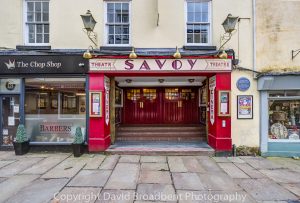
Y safle theatr hynaf yng Nghymru, mae'r adeilad rhestredig hardd gradd 2 hwn yn edrych fel y sinema berffaith. Neu os ydych chi yng Nghaerdydd, dewch i Ganolfan Gelfyddydau Chapter, sydd â rhaglen enfawr drwy gydol y flwyddyn o ffilmiau annibynnol yn ogystal â pherfformiadau arbrofol, arddangosfeydd a chaffi-bar.
Draw yng ngorllewin Cymru, mae Theatr Gwaun yn Abergwaun. Mae'n theatr gymunedol annibynnol, wedi’i chefnogi gan dîm angerddol o wirfoddolwyr. Yno mae sinema, bar a chaffi gyda dewis helaeth o ddigwyddiadau, ac mae arfordir hardd Sir Benfro megis tafliad carreg ohoni.
Yn y bôn, fe allech lunio taith o amgylch Cymru, gyda sinema ym mhob stop. Swnio'n dda? I helpu gyda hyn, rydym wedi llunio rhestr lawn a map i'ch helpu chi i weld ble mae pob sinema. Byddwn yn tynnu sylw atynt ar ein cyfryngau cymdeithasol,yn ogystal â ble gallwch ddod o hyd i'ch gŵyl, clwb ffilm neu sgrin gymunedol agosaf.
Os ydych chi'n rhedeg sinema a heb eich rhestru isod, efallai bod hyn oherwydd eich bod wedi'ch rhestru fel sgrin gymunedol. Os hoffech gael eich ychwanegu (neu os hoffech gael eich tynnu o'r rhestr hon), cysylltwch â ni.Byddem wrth ein boddau’n clywed gennych. Gall sinemâu Cymru hefyd ymaelodi â Chanolfan Ffilm Cymru am ddim a gwneud cais am gyllid datblygu cynulleidfaoedd yn ogystal â chael mynediad at hyfforddiant, rhwydweithio a chyngor.


Hub Members Attend ICO Screening Days
Film Hub Members attend ICO’s Screening Days with help from training bursary
The ICO (Independent Cinema Office) runs national Screening Days events, a staple in the independent cinema calendar giving exhibitors the chance to watch the best upcoming film releases from across the globe and discuss them with industry peers. The Screening Days took place in both Nottingham and London in Autumn and Spring where hub members from Cymdeithas Ffilm Y Fenni, Chapter Cardiff, a Pontardawe Film Club went along to not only see upcoming releases to help develop their programmes but also for invaluable networking and discussions.
Here’s what our members told us about their experience:
These informal discussions are so helpful in sharing best practice and picking up hints and suggestions on marketing appropriate to the films. Meeting with the Film Promoters in person is always appreciated as it makes the booking of the films straight forward.
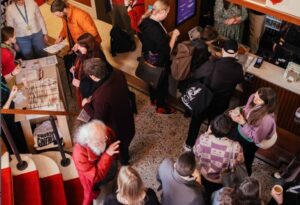 The ICO Screenings Days provide members with the opportunities to explore new UK independent and foreign language film releases as well as being able to discuss programming of various films directly with the representatives of distribution companies. David Charles Price attended on behalf of the Cymdeithas Ffilm Y Fenni to explore new UK independent and foreign language film releases. Dave came away with a plan for the next season’s programme, new contacts and potential new partnership with Borderlines Festival where they plan on sponsoring a film. Angie Dickinson attended on behalf of Pontardawe Film Club and found this opportunity significant in the programming for the venue, ultimately amending their original suggestions based off of the outcomes of attending the Screening Day as well as new marketing ideas thanks to meeting Promoters in-person.
The ICO Screenings Days provide members with the opportunities to explore new UK independent and foreign language film releases as well as being able to discuss programming of various films directly with the representatives of distribution companies. David Charles Price attended on behalf of the Cymdeithas Ffilm Y Fenni to explore new UK independent and foreign language film releases. Dave came away with a plan for the next season’s programme, new contacts and potential new partnership with Borderlines Festival where they plan on sponsoring a film. Angie Dickinson attended on behalf of Pontardawe Film Club and found this opportunity significant in the programming for the venue, ultimately amending their original suggestions based off of the outcomes of attending the Screening Day as well as new marketing ideas thanks to meeting Promoters in-person.
It was not only useful to hear about strategies but also essential to demonstrate solidarity and compassion for each other as colleagues in our sector as we move forward and help each other.
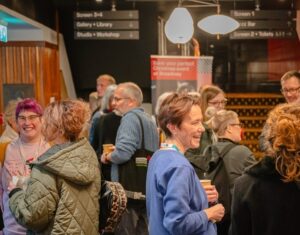
Claire Vaughan from Chapter Cardiff attended the Screening finding the in-person films vital to having greater programming knowledge. Having secured bursary funding, Claire was also able to attend the ICO Audience Development day and arrange meeting with other venues in the area who have a similar offering to Chapter, visiting Derby QUAD, HOME Manchester and Phoenix Leicester. The visits and audience development day provided Claire with more in-depth knowledge on young audiences, an understanding of other venues’ strategy on resilience, leading to further meetings, as well as information on audience’s Eco credentials which she was able to feed back to the team and the UKCA policy.
Dave, Claire and Angie were able to attend the ICO Screening Days with the support of Film Hub Wales via our Bursary scheme. If you want to attend a meeting, course or event that would benefit your organisation and develop audiences but the costs are prohibitive, you can submit an application for support here.

TAPE talk Community Cinema Programming
Our Marketing and Outreach officer Holly spoke to the Media Club at TAPE Cerdd a Ffilm Cymunedol about their Neighbourhood Cinema project and how they programme and market films to rural communities in North Wales.
What is the Neighbourhood Cinema project?
We launched a cinema project called ‘Neighbourhood Cinema’ for communities across North Wales in 2023, with support from Film Hub Wales via BFI National Lottery funding. The project currently runs screenings at The Luxor Community Cinema in Llanfairfechan, various sites across Anglesey via Mencap Môn and at TAPE’s base in Colwyn Bay. We’re also exploring a number of ongoing partnerships with the aim of bringing films to communities where it’s more difficult to access regular film screenings.
What is the Media Club at TAPE and how is it involved?
Specialising in creative inclusion, we ‘co-created’ the project in collaboration with our Media Club – a safe and supportive space which offers hands on experiences to a cohort of people from across the local community. The Media Club focuses on giving people aged 18 and over the opportunity to gain experience in podcasting, sound recording, film reviews and cinema programming. The club meets weekly as a part of TAPE’s session schedule.
How do you programme films?
We watch films as a club. Sometimes we watch them at home by ourselves or as a group. We then come together to discuss whether we think they will be good choices for us here at TAPE and the other Neighbourhood Cinema venues we programme for. Recently, the group all really enjoyed Snow Leopard, The Mountain Within Me a Strange Darlings. We are keen to fit those into ours and Llanfairfechan’s programmes somewhere! Snow Leopard was one of the best films we have seen in a long time, it was absolutely brilliant. We try to pick films that people wouldn’t necessarily choose to watch or can’t find at mainstream cinemas, so we can provide that experience for them.
come together to discuss whether we think they will be good choices for us here at TAPE and the other Neighbourhood Cinema venues we programme for. Recently, the group all really enjoyed Snow Leopard, The Mountain Within Me a Strange Darlings. We are keen to fit those into ours and Llanfairfechan’s programmes somewhere! Snow Leopard was one of the best films we have seen in a long time, it was absolutely brilliant. We try to pick films that people wouldn’t necessarily choose to watch or can’t find at mainstream cinemas, so we can provide that experience for them.
Do you try to estimate audience numbers for your screenings?
We do try to estimate numbers for the screenings as we programme. It’s difficult to be concrete about it as a lot of our screenings are free. People sign up for tickets but may not make it to the screening. We’ve tried lots of different ideas to retain as many people as possible, but you can’t win against the elements! If it’s been raining all day, we have reduced numbers (even though a rainy day is the perfect excuse to hide away at the cinema!)
With the Neighbourhood Cinema project, we’re trying to work with venues in places people can get to despite weather and transport issues. Small rural villages are perfect because people do tend to make the journey if the film is really good and they can walk to it (and we always programme really good films!)
The Luxor Community Cinema in Llanfairfechan is a really good example of this. They hit the ground running with their first two screenings. I was at The Sound of Music screening and it was packed – the atmosphere was fantastic and we had such a good time. They also screened Brian and Charles and they had a great crowd there as well. After both screenings, they received feedback from the audience and there is a real enthusiasm there. People are making suggestions about what they want to see, and it feels like the venue has become involved within the community straight away and we have a really good partnership.
It’s great to hear that the Luxor has had such an amazing start! What do you think is working particularly well in Llanfairfechan?
Chris Potter, who runs the community hall is really active in running the whole centre. They are constantly telling people about the cinema and the upcoming screenings. The venue is already very well used by the local community, but the cinema has generated a lot of excitement in t

he village so there is enthusiasm there from the very start. They’ve also ensured that the community a part of the cinema experience, asking them for feedback on the screenings and suggestions about what they would like to see in the future. I think the village has wanted the cinema back for a long time.
We helped them out with the opening of the cinema, as we loaned them our air-screen whilst they crowd-funded the money for some permanent projection kit. We didn’t want them to have to wait any longer!
I think it was also a great idea to show The Sound of Music as their first screening, as it was the film that they were going to show before the Luxor Cinema closed down in 1964. The apprentice projectionist from 1964 actually came along to the screening as he still lives in the village, which just adds to the local history of it all! The Luxor is such a good example of what happens when you have the perfect venue and the perfect team.
Where do you go from the programming stage? What sort of marketing do you currently do to spread the word about your screenings?
We’re very active on our social media platforms – we mainly use Instagram and Facebook. We also produce an audio podcast that goes out every Saturday and they’ve been doing really well. Local radio has been really important for us, they’re supportive of our regular bespoke adverts for the events. It always feels like there is more marketing that we can do, and it is crucial to give people as much time as possible to find out about our events.
Is there anything else that you have done outside of marketing to increase engagement with your programme?
We’ve just started to do some programming with partner organisations. We started by working with Mencap Môn to programme for the Oriel Môn venue in Anglesey and that has been amazing from the start. We have just started to work with an organisation called Anheddau, which is a disability services and support organisation here in North Wales. They want to engage with the people who use their services more, so we are creating a bespoke programme together, which will be really special. We’re also in the process of talking with organisations like Mind to create similar bespoke programmes there as well.
We’ve also been doing some outreach screenings at film locations which has been really fun. We hosted a Halloween screening of our second feature film Approaching Shadows at the pub featured in the film. The screening was packed! The crowd were raucous in the best way and they loved it, it worked really well. We’re planning on going back to that same village in January to screen Brian and Charles, as that was also filmed there! It is a different way to engage these communities with Welsh films as well which is nice.
It’s a really exciting time for the project and we can’t wait to see where it goes in 2025.
Find out more about the Neighbourhood Cinema project yma.

Cardiff Animation Festival attends BFI FAN CON 2024
Ellys Donovan, Festival Producer of Cardiff Animation Festival tells us about her experience at BFI FAN CON 2024.
BFI FAN CON is a brand new conference for BFI FAN (Film Audience Network) members, from small community cinemas and touring collectives right up to large multi-screen independent cinemas and landmark film festivals. The inaugural event took place in September 2024 (Belfast) and Ellys attended on behalf of Cardiff Animation Festival.
Here’s what Ellys told us about her experience:
I had a brilliant time attending my first BFI FAN CON in Belfast. I attended a lot of insightful talks, discussions and training sessions and it was brilliant to meet everyone and talk so passionately about film exhibition and festivals.
Ellys attended the following talks, all of which she found were engaging and informative:
- Spotlight: Working with Communities in Underserved Areas
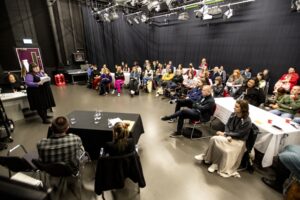
- Making Film Festivals More Sustainable and Inclusive
- Integrating Accessible Cinema Experiences For All Audiences
- Deaf Awareness Training
- ‘We’ll Come To You’ People Centred Approaches to Film Exhibition
- The Evolving Role of AI in Cinema
- Family Fortunes: Reaching Families and Children
The ‘Family Fortunes: Reaching Families and Children‘ talk was presented by Exeter Phoenix a Cinemagic Film Festival which explored how they have successfully engaged children / family audiences with their programme and developed a sustainable practice with families being one of their biggest audiences. This is something Cardiff Animation Festival will consider when programming in the future and how they can bring new content to families that would otherwise not have access to it on the big screen.
Read more about all the sessions above.
A community engagement session, We’ll Come to You: People-Centred Approaches to Film Exhibition (curated by Linnea Pettersson) explored potential barriers for audiences from underserved socio economic backgrounds and what can be done to to address them – this was helpful for Ellys in relation to the touring programmes they offer to communities across Wales and how they can consider a people-centred approach to their programming.
Linnea Pettersson is the BFI FAN Socio Economic Champion, read more and find resources here.
Ellys made several new connections with festivals and cinema programmers across the UK and Ireland which could result in more exciting collaborations for Cardiff Animation Festival in future. The new knowledge, training insights and contacts will be shared with the festival team to continue improving Cardiff Animation Festival events for the years ahead.
…the lunches and dinners at BFI FAN CON were a great, relaxed networking opportunity to meet fellow film exhibitors and gain an insight into how everyone approaches their work in a similar role to me – which is something I don’t often get the chance to experience.
Ellys attended BFI FAN CON with the support of Film Hub Wales via our Bursary scheme. If you want to attend a meeting, course or event that would benefit your organisation and develop audiences but the costs are prohibitive, you can submit an application for support here.

The Mark Lewis Jones Collection
As actor Mark Lewis Jones’ latest film Portraits of Dangerous Women hit cinema screens on October 11th 2024, he’s also is preparing to receive the BAFTA Cymru 2024 Siân Phillips Award. Across his 38-year acting career, he’s starred in a host of critically-acclaimed films and television dramas. To celebrate this achievement, we’ve curated a list of some of Mark’s films from our Made in Wales catalogue.
To see Mark’s full filmography and TV credits, click yma.

Ffigurau Cudd: Cwrdd ag aelodau Canolfan Ffilm Cymru sydd yn rhedeg prosiectau yn 2024
Bob tro y byddwch yn gwylio ffilm ar sgrin fawr, mae tîm o bobl yn gweithio'n galed y tu ôl i'r llenni i sicrhau eich bod yn cael y profiad gorau. Eleni, byddwn yn eich cyflwyno i'r bobl y tu ôl i'n prosiectau a ariennir – ffigurau cudd arddangosfa ffilm yng Nghymru. O gyfarwyddwyr prosiect i guraduron ac arbenigwyr marchnata sydd i gyd yn rhoi cynhwysiant wrth wraidd eu gweithgareddau arddangos...

Sol Cinema attends Sheffield DocFest 2024
Paul O’Connor, Co-Founder of Sol Cinema attended Sheffield DocFest 2024 and told us about his experience after 10 years away from the festival…
Sheffield DocFest is the UK’s leading documentary festival and one of the world’s most influential markets for documentary projects. They champion and present the breadth of documentary form – film, television, immersive and art – in the vibrant city of Sheffield each June at Showroom Cinema.
Paul was hoping to attend workshops, film screenings, meet filmmakers and event organisers to explore collaborations with Sol Cinema which brings new audiences to see short films they wouldn’t usually see.
Here’s what Paul told us about his festival experience:
I attended a VR workshop and will be exploring new options around that. I was impressed with the software DocFest used for including live audio translations at each panel discussion and I shall explore this for future Sol Cinema events.
 DocFest brought together filmmakers from across the world and Paul felt inspired by the networking sessions, workshops and film premieres he attended. A funding panel outlined the need to think differently about where to source funds, he gained insights into the current climate of the creative industries and he met potential new bookings for Sol Cinema.
DocFest brought together filmmakers from across the world and Paul felt inspired by the networking sessions, workshops and film premieres he attended. A funding panel outlined the need to think differently about where to source funds, he gained insights into the current climate of the creative industries and he met potential new bookings for Sol Cinema.
Paul attended the Sheffield DocFest with the support of Film Hub Wales via our Bursary scheme. If you want to attend a meeting, course or event that would benefit your organisation and develop audiences but the costs are prohibitive, you can submit an application for support here.

Dyfodol Canolfan Ffilm Cymru
Chwefror 13, 2023
Diweddariad gan y Rheolwr, Hana Lewis
Hoffwn gychwyn drwy ddiolch i bob un ohonoch am roi o’ch amser i fynych cyfarfodydd a chwblhau holiaduron yn ystod 2022, wrth i’r BFI ddatblygu eu strategaeth, Screen 2023. Mae’r ffaith ein bod ni wedi dod ynghyd gyda’r un nod o gefnogi arddangos ffilm yng Nghymru yn destun balchder i ni ac rydym wir yn gwerthfawrogi eich amser.
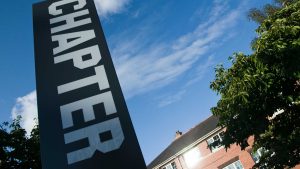 Bydd nifer ohonoch wedi clywed y cyhoeddiad diweddar gan y BFI bod Rhwydwaith Cynulleidfa Ffilm y BFI yn mynd i barhau tu hwnt i Ebrill 2023, fel rhan o’u Strategaeth 10 mlynedd Cyllid Loteri Genedlaethol. Mae’n bleser gen i rannu bod Film Hub Wales, gyda Chapter fel Sefydliad Arweiniol, yn un o 11 o bartneriaid strategol ledled y DU i dderbyn cyllid Loteri Genedlaethol gan y BFI i barhau i ddatblygu cynulleidfaoedd sinema ar gyfer ffilm annibynnol o’r DU a ffilm rhyngwladol.
Bydd nifer ohonoch wedi clywed y cyhoeddiad diweddar gan y BFI bod Rhwydwaith Cynulleidfa Ffilm y BFI yn mynd i barhau tu hwnt i Ebrill 2023, fel rhan o’u Strategaeth 10 mlynedd Cyllid Loteri Genedlaethol. Mae’n bleser gen i rannu bod Film Hub Wales, gyda Chapter fel Sefydliad Arweiniol, yn un o 11 o bartneriaid strategol ledled y DU i dderbyn cyllid Loteri Genedlaethol gan y BFI i barhau i ddatblygu cynulleidfaoedd sinema ar gyfer ffilm annibynnol o’r DU a ffilm rhyngwladol.
Beth mae hyn yn ei olygu i Gymru? Bydd Canolfan Ffilm Cymru yn derbyn £895,500 dros dair blynedd (£286,900 bob blwyddyn). Bydd yr arian yn cael ei rannu rhwng datblygu sgiliau, ymchwil cynulleidfa, cyfathrebu, prosiect ‘sbotolau’ newydd a’r gronfa arddangos ffilm – a fydd yn cael ei ail lansio yn hwyr ym mis Mawrth / yn gynnar ym mis Ebrill. Bydd y bwrsari hyfforddi a’r potyn llain yn parhau i fod yn agored drwy gydol y flwyddyn, gyda chyllideb newydd ym mis Ebrill.
Rydym yn gwneud rhai newidiadau i’n rhaglenni yn seiliedig ar yr hyn ddwedoch wrthym yn ystod y cyfnod ymgynghori a’r heriau sy’n wynebu’r sector arddangos. Rydym yn bwriadu cynnal sesiynau rhaglennu ar-lein bob chwarter er mwyn cael cyfle i sgwrsio am y ffilmiau diweddaraf. Rydym yn bwriadu dod at ein gilydd yn fwy aml, gan gynnwys digwyddiad blynyddol lle gallwn rannu syniadau. Yn ogystal, rydym yn siarad ag Archif Sgrin a Sain Cymru ynglŷn â mynediad at gynnwys Cymraeg ac yn archwilio beth fyddai costau digideiddio teitlau allweddol.

Mae ein prosiect Gwnaethpwyd yng Nghymru (sy’n dathlu ffilmiau gyda chysylltiad Cymreig) yn cael ei gyllido tan 31 Mawrth 2023 ar hyn o bryd. Rydym wrthi’n gweithio ar gynllun cyllido ar gyfer y dyfodol, gyda ffilmiau megis Being Hijra a London Recruits yn ein calendr. Byddwn hefyd yn cydweithio â’n partneriaid Ffilm Cymru Wales / BFI Network Cymru i gefnogi gwneuthurwyr ffilmiau newydd ledled y DU.ain 2023 ar hyn o bryd. Rydym wrthi’n gweithio ar gynllun cyllido ar gyfer y dyfodol, gyda ffilmiau megis India’s 1st Best Trans Model Agency a Comrade Tambo’s London Recruits yn ein calendr. Byddwn hefyd yn cydweithio â’n partneriaid Ffilm Cymru Wales / BFI Network Cymru i gefnogi gwneuthurwyr ffilmiau newydd ledled y DU.
Byddwn yn cydweithio â BFI Film Academy Plus, sydd newydd ei gyhoeddi fel y cynnig addysgiadol mewn canolfannau ledled y DU, a fydd yn helpu’r rheiny sydd rhwng 16 a 25 mlwydd oed i ffilmio llwybrau gyrfa a diwylliant. Bydd y cynnig yn cael ei redeg yng Nghymru gan Chapter a bydd cyllideb yn cefnogi dosbarthiadau meistr, dangosiadau a bwrsarïau. Bydd y cynllun yn helpu ffans ffilm ifanc i ddysgu am y diwydiant, gwylio sinema ddiwylliannol, dod i adnabod eu canolfannau lleol a datblygu sgiliau fel gwneuthurwyr ffilmiau a churaduron annibynnol.
Bydd rhagor o weithgareddau ar draws y Rhwydwaith Cynulleidfa Ffilm ehangach – byddwn yn trafod y rhain yn yr wythnosau nesaf wrth i’r cynlluniau cael eu sefydlu.
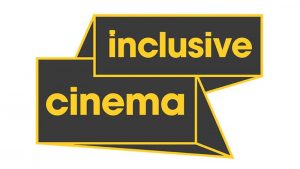 Yn olaf, mae’n flin gennym gyhoeddi bod prosiect RhCFf Sinema Cynhwysol (SC) yn dod i ben ym mis Mawrth. Mae gymaint o waith yn dal i’w wneud, ond rydyn ni’n falch iawn o’n huchelgais a’n cyfraniadau. Hoffem ddweud diolch o galon i bartneriaid a chynghorwyr SC. Rydym yn ffarwelio â Toki Allison, Rheolwr Prosiect talentog SC, wrth iddi symud ymlaen i rôl newydd gyffrous. Yn ystod wythnosau olaf y prosiect beth am achub ar y cyfle i ddefnyddio adnoddau newydd ardderchog, gan gynnwys Trans Loving Care a sinema Dosbarth-Gweithiol. Byddwn yn rhoi diweddariad dros y misoedd nesaf ynglŷn â sut i gael mynediad at yr adnoddau a grëwyd dros gyfnod y prosiect.
Yn olaf, mae’n flin gennym gyhoeddi bod prosiect RhCFf Sinema Cynhwysol (SC) yn dod i ben ym mis Mawrth. Mae gymaint o waith yn dal i’w wneud, ond rydyn ni’n falch iawn o’n huchelgais a’n cyfraniadau. Hoffem ddweud diolch o galon i bartneriaid a chynghorwyr SC. Rydym yn ffarwelio â Toki Allison, Rheolwr Prosiect talentog SC, wrth iddi symud ymlaen i rôl newydd gyffrous. Yn ystod wythnosau olaf y prosiect beth am achub ar y cyfle i ddefnyddio adnoddau newydd ardderchog, gan gynnwys Trans Loving Care a sinema Dosbarth-Gweithiol. Byddwn yn rhoi diweddariad dros y misoedd nesaf ynglŷn â sut i gael mynediad at yr adnoddau a grëwyd dros gyfnod y prosiect.
Rydyn ni’n gobeithio’n fawr y bydd modd i chi ymuno â ni yn Hub Helo yng Nghastell y Gelli, 23ydd Mawrth, lle byddwn yn siarad am y flwyddyn i ddod.
Tan hynny – sinema am byth!

International Youth Media Summit 2022
Dion Wyn Hughes is the Projects and Marketing Manager for Wicked Wales. He recently attended the International Youth Media Summit (IYMS) in Falkenberg, Sweden.
IYMS is an annual two-week event that brings together young people from different cultures to create media projects aimed at inspiring their own generation to take action and responsibility for the future. By confronting and examining global problems and exploring solutions together, they are bound in a shared purpose. Working toward a common goal and being accountable for a concrete creative product within a limited time period provides the perfect “stew” for collaboration. Here’s what Dion told us about the trip:

Attending IYMS was an eye-opening experience that broadened my mind about what we can do in Wales. While the primary basis of the summit is to empower change through filmmaking, it also gives you opportunities to meet like-minded programmers, activists and filmmakers from all across the globe.
Throughout a fortnight, the challenge was to create a PSA (Public Service Announcement) over seven topics the IYMS wanted to eradicate in the world through diplomacy and film. They are youth empowerment, environment, violence, women’s rights, poverty, health and discrimination. Each group were split into young filmmakers, young diplomats and advisors who all worked together to create a short film about their subject matter with the help of their mentor who worked within the assigned fields. By the end of the summit, they would have a completed film that will be shared with international audiences at film festivals, on YouTube and through their partners, including UNESCO.
There are various ways to encourage and embrace heritage, language and culture, from Afghanistan to Nepal to Norway. Each day there were numerous opportunities to hear about different nations, how they promote their countries’ work, and the best models to exhibit the films. While many have expressed their frustrations about funding and sharing their voices globally, the summit allows you to develop and work on further collaborations beyond the two-week summit.
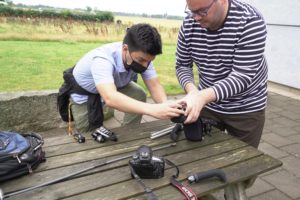 One of the main reasons Wicked Wales wanted to attend the summit was to engage with more young people. As they were the ones making the films and making positive changes in their communities, it was an enlightening experience. Hearing about the various programs they work on and their viewing habits benefited us as an organisation and for Wales as a whole. The diversity of delegates gave a fresh perspective on what works well for us and where we can improve and further diversity and inclusion in our sector.
One of the main reasons Wicked Wales wanted to attend the summit was to engage with more young people. As they were the ones making the films and making positive changes in their communities, it was an enlightening experience. Hearing about the various programs they work on and their viewing habits benefited us as an organisation and for Wales as a whole. The diversity of delegates gave a fresh perspective on what works well for us and where we can improve and further diversity and inclusion in our sector.
The main takeaway from IYMS is the importance of international collaboration and working with organisations to improve our methods and share our own practices from Wales. We can learn so much from one another, and Wicked Wales has already begun a dialogue with partners in Sweden and Nepal on how we can collaborate further. Fortunately, through social media, we can now stay in touch with some of the great film societies we connected with and keep an eye on the ideas and programming that they’re doing. We hadn’t looked further afield until now, so I think this will benefit us when determining our own programme and events.
Attending IYMS was an eye-opening experience that broadened my mind about what we can do in Wales. While the primary basis of the summit is to empower change through filmmaking, it also gives you opportunities to meet like-minded programmers, activists and filmmakers from all across the globe. – Dion Wyn Hughes
Dion attended the International Youth Media Summit with the support of Film Hub Wales via our Bursary scheme. If you want to attend a meeting, course or event that would benefit your organisation and develop audiences but the costs are prohibitive, you can submit an application for support here.

Women’s History Month: Welsh films by, featuring and about women
I ddathlu ''Mis Hanes Menywod'’ the Film Hub Wales team have put together a selection of Welsh films by, featuring or about Welsh women.
Among them are some names you might of heard of and some that are breaking onto the scene. From dramas, to documentaries and sci-fi, the cultural landscape of Wales becomes even more exciting this year thanks to the talents of these Welsh women delivering interesting, new narratives.
Mae'r rhestr hon wedi'i llunio fel rhan o Gwnaethpwyd yng Nghymru – a project that supports exhibitors and focuses on highlighting films and filmmakers with Welsh connections. Find out more about how we support filmmakers and distributors.

Women’s History Month: Sara Sugarman
Biography
Sara Sugarman was born in Rhyl, Denbighshire, Wales. She is an actress and director, known for Sid and Nancy (1986), Very Annie Mary (2001), Disney‘s Confessions of a Teenage Drama Queen (2004) and Vinyl (2012). In 1994 she won a place at Bournemouth Film School, scripted and directed three short films, nominated for a BAFTA, BAFTA CYMRU and won twenty three International film festivals.
When was the first time you realised you wanted to make films?
I sent away for a super 8 kit from the classified section of my dad’s newspaper when I was 11. It was plastic. I still have the camera and it was so so exciting! I wanted to remake JAWS on Rhyl beach and this was the time I realised I could make my imagination have a place telling stories.
What was the last project you worked on / made?
Just finished shooting SAVE THE CINEMA for Sky cinema.
What are you up to now? What is the next project you’re working on?
I am editing the film now. I feel very lucky in a time of a pandemic to be making a movie.

Women’s History Month: Pauline Williams
Biography
Producer, writer and former co-director of Gaucho production company. Producer of award winning feature films One Full Moon, Leaving Lenin a The Making of Maps. Multi BAFTA award winner as producer of numerous TV drama series & film. Mentor & producer of short film projects nurturing new directors & writers. Project manager for Off y Grid, a Film Hub Wales initiative. Currently producing short films in a pilot project between Wales and Nepal and developing a TV drama series for young people.
When was the first time you realised you wanted to make films?
As a child, cinema was a regular feature on a Saturday morning & over the years the more films I saw the more I fell in love with the big screen. However I always thought that working in films was an impossible dream for a girl from the sticks. After a brief mindset detour – when I thought I would become a surgeon- I realised that this was definitely not for me. Throughout adolescence, university & the early days of my career film has always fired my imagination & has transported me to other worlds & cultures.
What was the last project you worked on / made?
I wrote & produced a 3 part drama series for S4C, filmed in Wales & Majorca.
What are you up to now? What is the next project you’re working on?
Mentoring a filmmaking course for young people + waiting for venues to open to rekindle Off y Grid activities as a project manager/co-ordinator and producing a 6 part drama series for young people. Also I’m considering potential film projects. I have just accepted an invitation to produce/mentor 3 short films with young filmmakers from Wales as part of the International Youth Media Summit. This is a collaboration between Nepal & Wales. I’m also a producer/mentor on a forthcoming filmmaking course for young people in North Wales.
Useful links: